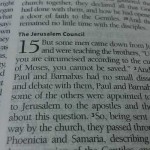The Jerusalem Council – Literary Position

As I mentioned in a previous post (“The Jerusalem Council – Introduction“), I’m working through a series of posts on the so-called “Jerusalem Council” of Acts 15:1-35. In this second post, I’m going to look at the literary position of this passage in relation to the book of Acts.
Why would I be concerned with literary position? Well, if you look at the quotes from the previous post, you’ll see that some scholars (I used Polhill as an example) suggest that Acts 15:1-35 marks the literary center of the book of Acts.
However, there is a problem with this view. For one thing, if Acts 15:1-35 were the literary center of the book, then we should expect what follows to build off of this passage. Unfortunately, the Jerusalem Council is not mentioned again in the Book of Acts.
In fact, if we study Acts 15:1-35 in the context of the Book of Acts, we will find that Acts 15 actually follows and depends upon previous passages.
In Acts 10, Luke records the account of a Gentile named Cornelius sending for Simon Peter (Acts 10:1-6). As he sends for Peter, the apostles is seeing visions of all kinds of food being lowered from heaven and hearing a command to eat from those foods (Acts 10:9-15). Later, Peter is invited to the home of a Cornelius (Acts 10:17-22). When Peter goes to that house, he recognized the connection between his visions and his current predicament. He understands that he (as a Jews) is to accept and proclaim the gospel to Gentiles (Acts 10:34-35). As he proclaims the gospel, all of the Gentiles present are filled with the Spirit and begin speaking in tongues (Acts 10:44-45).
In Acts 11, Peter retells the entire story from Acts 10 because some Jewish Christians (of the circumcised party) were upset that the gospel had been proclaimed to and received by Gentiles. The result of Peter’s story is that those listening glorified God and said, “Then to the Gentiles also God has granted repentance that leads to life” (Acts 11:18).
If this sounds familiar, it is because Peter refers to this episode during the “Jerusalem Council.” This is what Luke records:
And after there had been much debate, Peter stood up and said to them, “Brothers, you know that in the early days God made a choice among you, that by my mouth the Gentiles should hear the word of the gospel and believe. And God, who knows the heart, bore witness to them, by giving them the Holy Spirit just as he did to us, and he made no distinction between us and them, having cleansed their hearts by faith. Now, therefore, why are you putting God to the test by placing a yoke on the neck of the disciples that neither our fathers nor we have been able to bear? But we believe that we will be saved through the grace of the Lord Jesus, just as they will.” (Acts 15:7-11 ESV)
So, according to Peter, the “Jerusalem Council” is actually a follow-up to the meeting that occurred in Acts 11. Literarily, then, Acts 15:1-35 falls under the shadow of Acts 10-11, not only because of the length of the first passage and the repetition of the first passage, but because the second passage refers back to and depends on the first passage. Without Acts 10-11, Acts 15:1-35 would not make sense.
Thus, if Acts 15:1-35 is important literarily, it is only because Acts 10-11 is important literarily, and actually more important.
In the next post, I’ll look at the narrative of Acts and how Acts 15:1-35 fits into that narrative. Does Acts 15:1-35 form the center of the story of Acts and particularly is it pivotal to the plot of the book and the Pauline mission?

Alan:
While you might be correct in a sense that the Jerusalem Council is not mentioned specifically in Acts after Acts 15, it is alluded to in in Acts 21:25 in the mention of the prohibitions. In fact, the apostolic prohibitions are mentioned three times in Acts. (I did my Th.M thesis on the prohibitions.) I don’t have time to get into it here, but I do think the general consensus that Acts 15 is the center, watershed, etc. is correct. Besides Polhill, you can see Witherington, Marshall, L.T. Johnson, Harrington, Bock, and others.
Charles,
I understand that the idea that the Jerusalem Council is a “watershed” event is a scholarly consensus. By the way, I also think that the “prohibitions” are the most important thing to come out of the Jerusalem Council. I’ll talk about them in my last post.
-Alan
Alan:
Just in case you might be interested. Here is a link to a journal article which was derived from part of my Th.M. thesis on the prohibitions: http://www.galaxie.com/article/5830
Charles, thanks for the link. I am interested in Alan’s observations and yours.